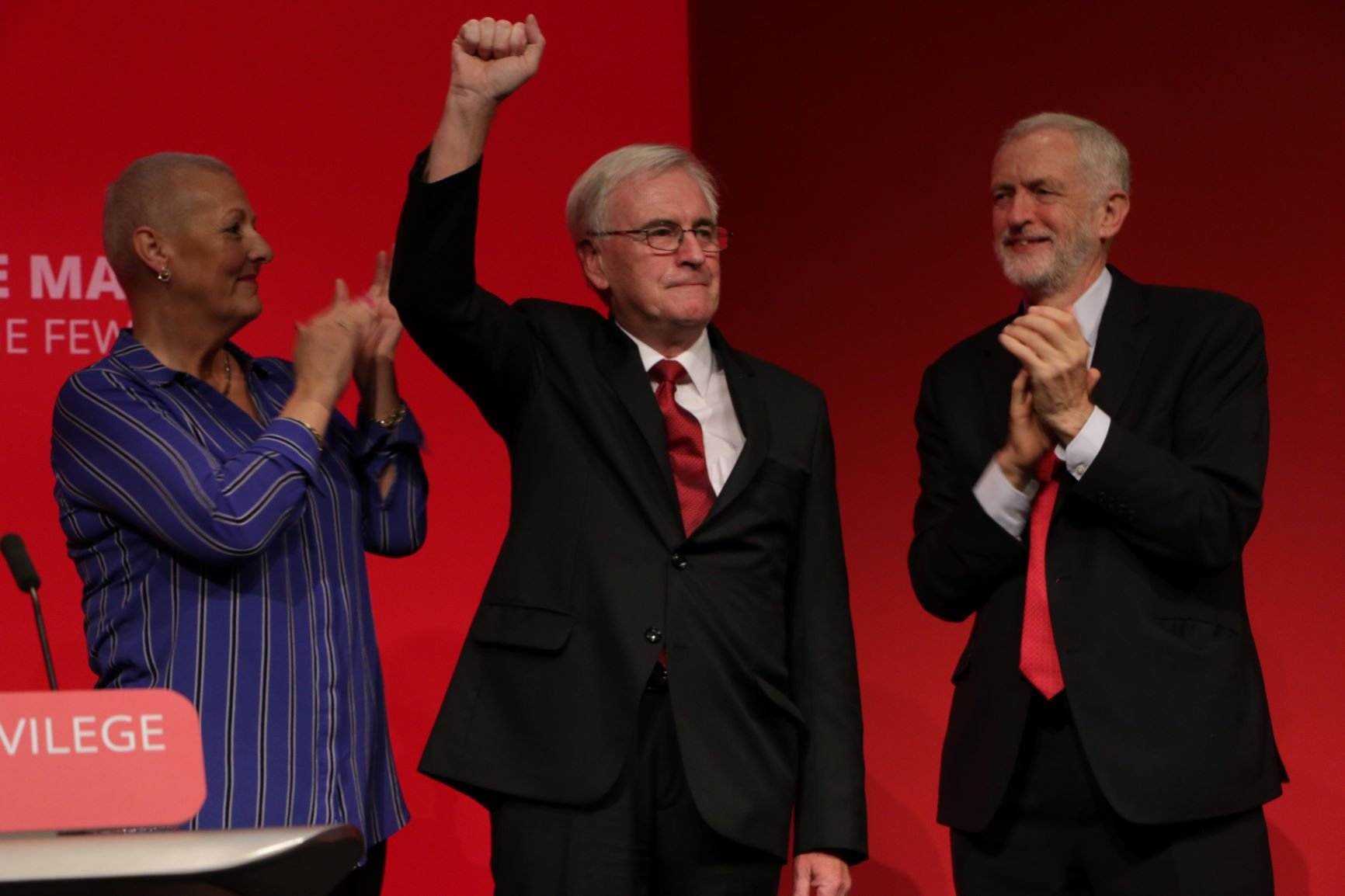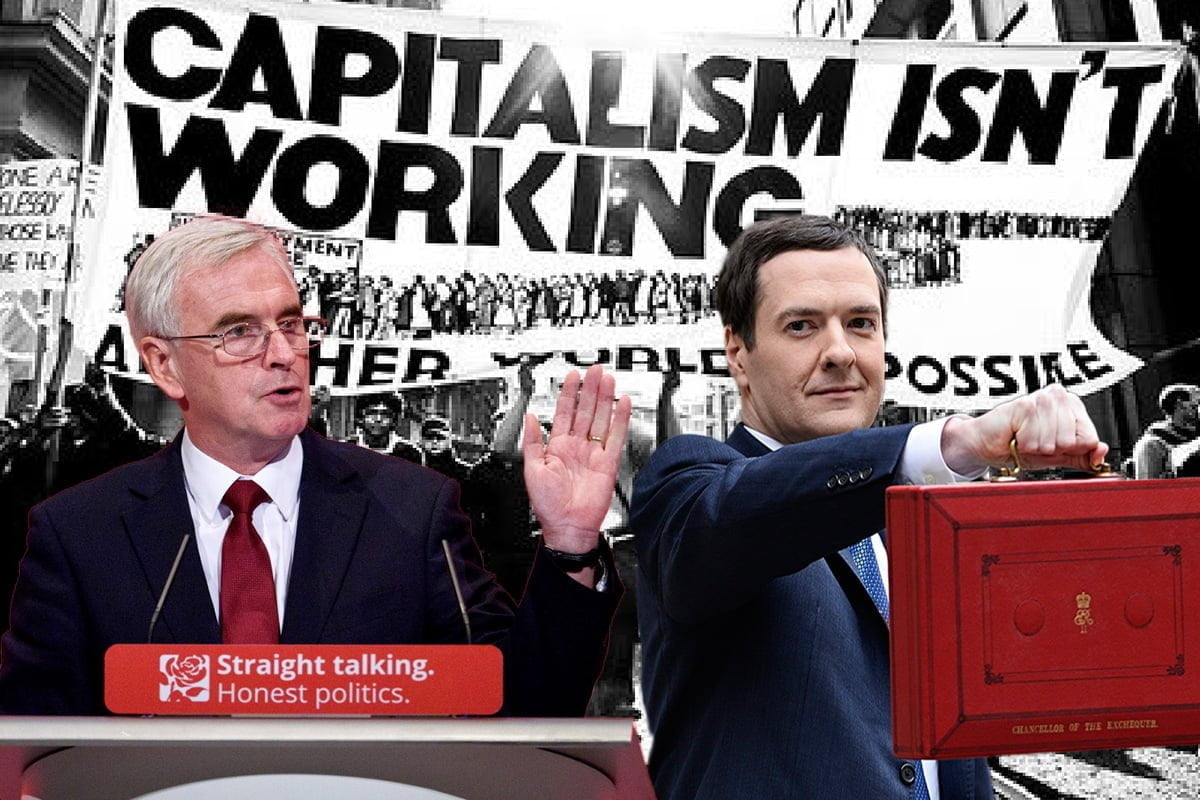All the focus around Osborne’s latest Budget announcement was on the dire forecasts for the state of the UK economy, signalling that growth is slowing and years of austerity lie ahead. Rather than committing Labour to a clear anti-austerity programme of socialist policies, however, McDonnell is pledging to balance the books.
All the talk in the press was focussed on the new tax on sugary drinks. George Osborne’s latest Budget, however, revealed by the Chancellor on Wednesday 16th March, still contained plenty of sweeteners for the bosses and bankers. With corporation tax cut and austerity set to continue, big business was left smiling, as stressed by Carolyn Fairbairn, Director General of the CBI (Confederation of British Industry), the bosses union:
“After a year of surprises, this was a stable Budget for business facing global stormy waters. The Chancellor has listened to our concerns about the mounting burden on firms and chosen to back business to grow the economy out of the deficit.
“Businesses will welcome the Chancellor’s permanent reforms…The reduction in the headline Corporation Tax rate sends out a strong signal that the UK is open for global business investment.”
But beyond the distractions (the sugar tax), the continued attack on public services (all state schools set to become academies), and the commitment to further austerity (£3.5bn of extra cuts by 2020), the real focus of Osborne’s budget was on these “stormy waters” that lie ahead for the global economy. From the slowdown in China to the spectre of “Brexit” that haunts European capitalism – and the Tory Party itself: the period ahead for British – and world – capitalism is one of continuing crisis, turbulence, and instability.
Indeed, the EU Referendum – and the slow motion implosion taking place within the Tories over the question of Europe – was the elephant in the room during the Chancellor’s Budget announcement. As Janan Ganesh commented in the Financial Times, “Tory MPs, many of whom resent Mr Osborne’s pro-EU line, had to be soothed too, or at least not provoked further…The overall impression was of an almost apologetic Budget, crafted with stability and party management in mind.”
Nevertheless, the Chancellor couldn’t help himself in using his Budget speech to have a dig at the Eurosceptics in his own party, highlighting the added risks that the Referendum and the threat of Brexit pose to the UK economy. Such comments by Osborne will doubtless by taken as a provocation by the Leave camp, serving to heighten the tensions and divisions within the Tories at this time when the ruling class requires a united, strong bourgeois party to carry out the cuts that the crisis-ridden capitalist system necessitates.
The system has stalled
 After being granted a gift by the Office of Budget Responsibility (OBR) in his Autumn Statement last November, when Osborne was able to temporarily slow down the pace of austerity and U-turn on planned tax credit cuts thanks to £27bn in improved estimates for future tax receipts and lower debt repayments, this time around the OBR was instead a harbinger of doom.
After being granted a gift by the Office of Budget Responsibility (OBR) in his Autumn Statement last November, when Osborne was able to temporarily slow down the pace of austerity and U-turn on planned tax credit cuts thanks to £27bn in improved estimates for future tax receipts and lower debt repayments, this time around the OBR was instead a harbinger of doom.
From economic growth and productivity to borrowing and debt, Osborne was forced to eat humble pie and acknowledge defeat on multiple fronts. Having staked his reputation on bringing down the debt and revitalising a stalled British economy, the Chancellor was left making an embarrassing admission of failure, with the OBR cutting growth forecasts for the next five years, public sector borrowing estimates on the rise, and a resultant increase in the national debt-to-GDP ratio. As the Financial Times wryly noted:
“Responding to criticism that his OBR had found money for the chancellor down the back of the sofa three months ago only to lose it again, Mr Chote [Chairman of the OBR] said that these sorts of forecast changes were normal. ‘What the sofa gives, the sofa can easily take away,’ Mr Chote said caustically.”
Importantly, the OBR’s analyses indicated that productivity growth is falling and business investment is down. As a result of its century long decline, with Tory and New Labour governments reorienting the economy over the past few decades on the basis of an orgy of casino gambling in the City of London and Canary Wharf, British capitalism is in a parlous state, and has been hit particularly hard by the global crisis that began in 2008. The chickens are now coming home to roost for the ruling class. With the UK economy dominated by spivs and speculators, reliant on an army of low-wage, zero-hour contract precarious jobs, investment – the motor force of genuine growth – is down and productivity is slowing. In short, the system has stalled.
The result of these ominous forecasts is that Osborne, in order to meet his target of eliminating the deficit within this government, will plough ahead with his programme of austerity, carrying out even deeper cuts and attacks on a working class that has already endured six years of Tory onslaught.
Labour’s “fiscal credibility”
Whilst the Tory Chancellor, wary of the dark clouds on the horizon, was reticent to commit to balancing the budget in the short term, John McDonnell – the Shadow Chancellor and Corbyn’s key ally in the Parliamentary Labour Party – has been busy promoting Labour’s new pledge of “fiscal credibility”.
Desperate to prove that Labour will be economically “competent” and “responsible”, still bearing guilt for Labour being at the helm at the time of the 2008 crash, and keen to rectify the embarrassment of his Little Red Book stunt over the 2015 Autumn Statement, McDonnell and his assembled council of economic advisors have crafted a set of self-imposed budgetary rules to eliminate the deficit.
Promising the “struggle of a generation” and “iron discipline”, McDonnell has taken to the media to provide assurance that Labour would work with the “wealth creators” – “the businesses”; “the entrepreneurs” – to balance the books. Amidst all the various Keynesian caveats – to borrow for public investment and abandon the new fiscal rule in times of crisis in order to stimulate the economy – the overwhelming impression given by the Shadow Chancellor was to appear no different from the his predecessors, Ed Balls and Gordon Brown. “Let me make it absolutely clear,” McDonnell stressed on the BBC’s Today programme, “I will be absolutely ruthless about how we manage our spending.”
John McDonnell | Andrew Marr Show | 13 March 2016
Today on the Andrew Marr show I talked about George Osborne’s failures ahead of the budget next week and Labour’s plans for the future of our economy. We need strategic investment for the long term in skills, infrastructure and new technology.
Posted by John McDonnell on Sunday, 13 March 2016
Attempting to square the circle of maintaining an anti-austerity programme whilst still committing to the elimination of the deficit, McDonnell has tied himself in knots, providing nothing more than a mess of confused soundbites: “Socialism is about planning, and planning is about making sure every penny is spent effectively”; “There is nothing left-wing about excessive spending”; “There is nothing socialist about running up too much debt”; “When governments do not manage their finances responsibly, it is ordinary working people who eventually suffer”; and “We’re about managing the economy effectively, and actually that’s what socialism is all about”.
Trusted by whom?
Whilst the nominal aim of such rules and statements is to increase the public’s trust in Labour’s economic competence and make a Corbyn-led Labour Party “electable”, all that most workers and youth will hear from such rhetoric is a Tory-lite version of cuts and austerity; a pale imitation of the real masters of austerity – Osborne, Cameron, et al.
In reality, by citing the support of the IMF, the CBI, and the British Chambers of Commerce, and by surrounding himself with a team of pro-capitalist, Keynesian economic advisors such as Joseph Stiglitz and Thomas Piketty, McDonnell is indicating who the real target audience is for his speeches: his capitalist critics in the Establishment, the PLP, and the bourgeois media. Whilst hundreds of thousands of newly politicised workers and young people are looking towards Corbyn for an anti-austerity alternative to Tory cuts, McDonnell is busy trying to prove that Labour can be “respectable” and “trusted” – that is, respectable to the ruling class and trusted to manage capitalism.
Far from making Labour “electable”, the adoption of this stance has dynamite built into its foundations. Attempts to appear “statesmanlike” and “economically credible” did not help Miliband and Balls, whose similar promises and rhetoric helped lead Labour into a humiliating electoral defeat. Nor did a move to the mythical “centre ground” aid Jim Murphy and the Scottish Labour Party, who were annihilated by the SNP and the enthusiasm amongst ordinary people for their pledge to fight Tory cuts.
Nor did “responsible” economic policies and the backing of big business help Corbyn’s challengers in the Labour leadership election, who all suffered at the hands of the left-wing candidate’s anti-austerity message and subsequent landslide victory. And nor, most importantly, did such efforts help Alexis Tsipras, the SYRIZA leader and Greek Prime Minister, whose attempts to find a way out of the crisis within the confines of capitalism have led to he and his party carrying out worse austerity and attacks on the working class than his New Democracy (Greek-Tory) predecessors.

End austerity! End capitalism!
Rather than appealing for “respectability” and bending the knee before the bosses, the Establishment, and a cabal of hostile media moguls, Corbyn and McDonnell should build on the enthusiasm and energy they have generated amongst millions of workers and youth with their promise for a “new politics” – a break with the status quo of parliamentary careerism, Westminster scandal, and Tory austerity – by putting forward a bold programme of socialist policies.
As all the forecasts and figures indicate, capitalism has reached an impasse and offers no way forward for society. A break with austerity is possible, but only on the basis of breaking with capitalism, a system which – in this epoch of crisis – demands a full frontal assault against the working class and the reforms it has conquered through struggle over previous generations.
On the basis of a socialist programme – to plan the economy on the basis of nationalised industries and banks, under workers’ control – the enormous wealth within society, which currently lies wasted and idle in the hands of the 1%, could be put to use to meet the needs of the many and not the profits of the few. Such a programme would inspire workers and youth across Britain to rally behind a Corbyn-led Labour Party and act as a beacon for the millions internationally who are currently facing a future of despair under capitalism. This is the programme that the Marxists are fighting for – and we invite you to join us in this fight.






